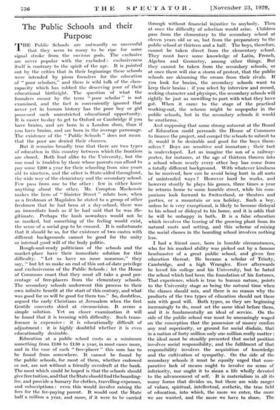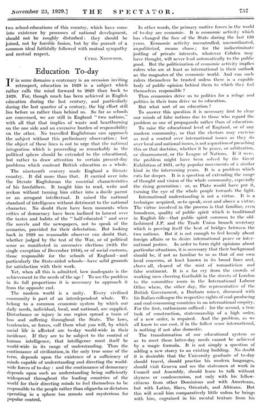The Public Schools and their Purpose
THE Public Schools are outwardly so successful that they seem to many to be ripe for some signal stroke from the envious gods. The exclusive are never popular with the excluded : exclusiveness itself is contrary to the spirit of the age. It is pointed out by the critics that in their beginnings these schools were intended by pious founders for the education of " poor scholars," and there is wild talk of the class- rapacity which has robbed the deserving poor of their educational birthright. The question of what the founders meant by the term " poor scholar " is not examined, and the fact is conveniently ignored that never yet in human history has the poor boy or girl possessed such unrestricted educational opportunity. It is easier to-day to get to Oxford or Cambridge if you have brains, and are born in a London slum, than if you have brains, and are born in the average parsonage. The existence of the " Public Schools " does not mean that the poor are denied their chances.
But it remains broadly true that there are two types of education in this country between which the frontiers are closed. Both lead alike to the University, but the One road is trodden by those whose parents can afford to pay some £200 a year for their schooling from nine years old to nineteen, and the other is State-aided throughout, the wide way of the elementary and the secondary school. Few pass from one to the other : few in either know anything about the other. Mr. Compton Mackenzie makes the hero of " Sinister Street " relate how, when as a freshman at Magdalen lie stated to a group of other freshmen that he had been at a day-school, there was an immediate hush as if he had said that he was ille- gitimate. Perhaps the hush nowadays would not be so marked, but something of the feeling would exist, the sense of a social gap to be crossed. It is unfortunate that it should be so, for the existence of two castes with different backgrounds cannot be good for the unity or internal good will of the body politic.
Rough-and-ready politicians of the schools and the market-place have their immediate solution for this difficulty. " Let us have no more nonsense," they say, " but let us make an end of this out-of-date privilege and exclusiveness of the Public Schools : let the House of Commons enact that they must all take a good per- centage of free-placers from the elementary schools. The secondary schools underwent this process to their own infinite benefit at the start of this century, and what was good for us will be good for them too." So, doubtless, argued the early Christians at Jerusalem when the first Gentile converts shied at circumcision. It seems a simple solution. Yet on closer examination it will be found that it is teeming with difficulty. Such trans- ference is expensive : it is educationally difficult of adjustment : it is highly doubtful whether it is even educationally desirable.
Education at a public school costs as a ininimum something from £180 to £150 a year, in most cases more, and in the case of each " free-placer " this sum has to be found from somewhere. It cannot be found by the public schools, for most of them, whether endowed or not, are not without a friendly overdraft at the bank. The most which could be hoped is that the schools should give free tuition, and that the State should find the boarding- fee, and provide a bursary for clothes, travelling-expenses, and subscriptions : even this would involve raising the fees for the fee-paying parent. It would cost the State half a million a year, and more, if it were to be carried through without financial injustice to anybody. Then at once the difficulty of selection would arise. Children pass from the elementary to the secondary school at eleven years old or so, but from the preparatory to the public school at thirteen and a half. The boys, therefore, cannot be taken direct from the elementary school. They must have some knowledge of Latin, French, Algebra and Geometry, among other things. But they cannot be taken from the secondary schools, or at once there will rise a storm of protest, that the public schools are skimming the cream from their rivals. If you look for brains, the secondary schools want to keep their brains : if you select by interview and record, seeking character and physique, the secondary schools will rightly be just as unwilling to part with what they have got. When it came to the stage of the practical working-out, the scheme might be unpopular in the public schools, but in the secondary schools it would be anathema.
And supposing that some strong autocrat at the Board of Education could persuade the House of Commons to finance the project, and compel the schools to submit to it, would it be desirable and good for the boys them- selves ? Boys are sensitive and immature ; their tact is undeveloped. Let us imagine the son of a railway- porter, for instance, at the age of thirteen thrown into a school where nearly every other boy has come from a totally different background. With whatever kindness he be received, how can he avoid being hurt in all sorts of unintended ways ? However hard he works, and however stoutly he plays his games, three times a- year he returns home to some humble street, while his com- panions look forward to Switzerland, or theatres and parties, or a mountain or sea holiday. Such a boy, unless he is very exceptional, is likely to become disloyal to his school or disloyal to his home, and it is odds that he will be unhappy in both. It is a false education which involves the tearing of the growing plant from its natural roots and setting, and this scheme of mixing the social classes in the boarding school involves nothing less.
I had a friend once, born in humble circumstances, who for his marked ability was picked out by a famous headmaster of a great public school, and given free education thereat. He became a scholar of Trinity, Cambridge, and a high Wrangler. Ever afterwards he loved his college and his University, but he hated the school which had been the foundation of his fortunes. That experience, which is true to human nature, points to the University stage as being the natural time when the classes should mix, and there is no reason why the products of the two types of education should not there mix with good will. Both types, as they are beginning increasingly to do, must set the same ideal before them, and it is fundamentally an ideal of service. On the side of the public school war must be unceasingly waged on the conception that the possession of money confers any real superiority, or ground for social disdain, that in a nation of forty million only one million really matter : the ideal must be steadily presented that social position involves social responsibility, and the fulfilment of that responsibility involves the acquisition of knowledge and the cultivation of sympathy. On the side of the secondary schools it must be equally urged that com- parative lack of means ought to involve no sense of inferiority, nor ought it to mean a life wholly devoted to the advancement of self. It is materialism in all its many forms that divides us, but there are wide ranges of values, spiritual, intellectual, aesthetic, the true field of education, into which, the more we enter, the more we are wanted, and the more we have to share. The two school-educations of this country, which have come into existence by processes of national development, should not be roughly disturbed : they should be joined, not by forcible fusion, but by the pursuit of a common ideal faithfully followed with mutual sympathy and ,mutual respect.
CYRIL NORW 00D.,































































 Previous page
Previous page